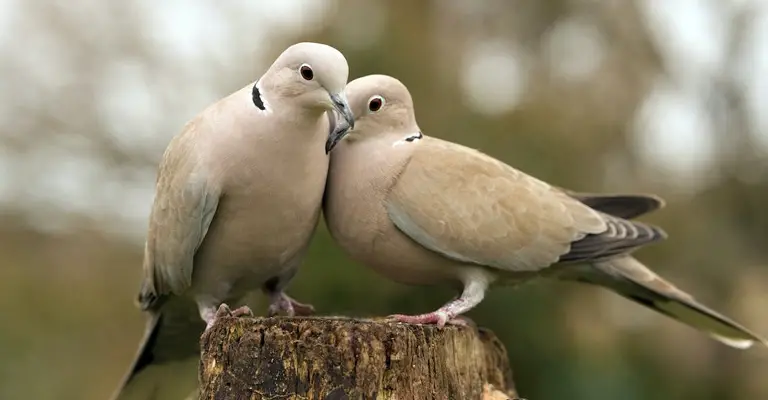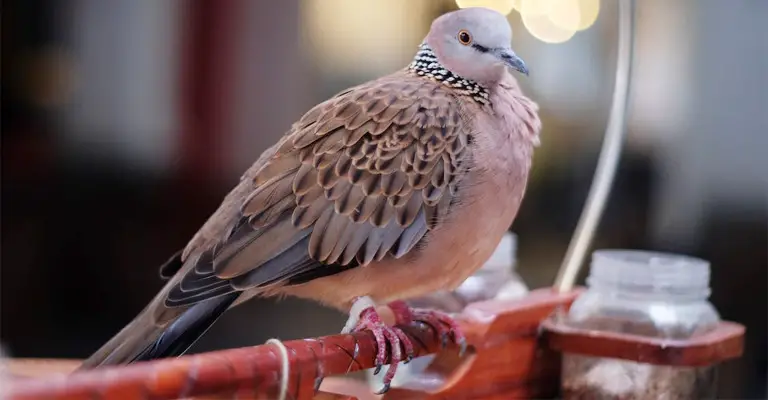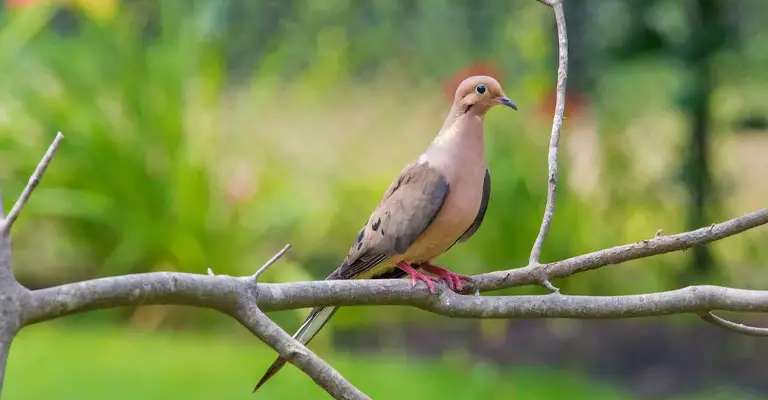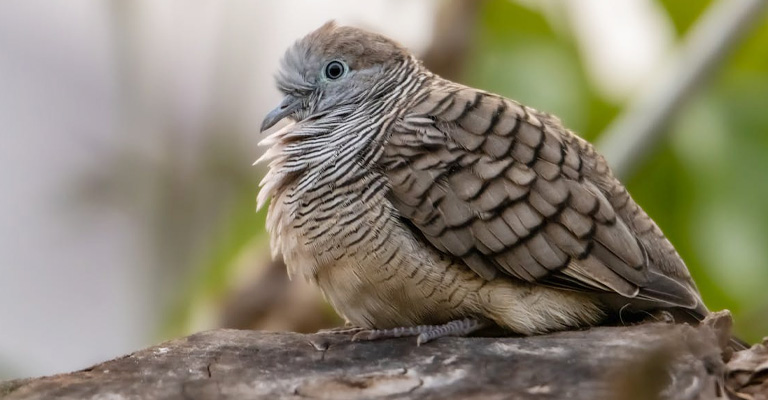Raising two doves in your home can be a delightful and rewarding experience. These gentle and sociable birds make wonderful companions, and with proper care, they can thrive in a domestic environment.
Whether you’re a first-time dove owner or looking to expand your avian family, understanding their unique needs is crucial to ensure their well-being. Here, we will explore ‘How can I take care of two doves’, covering everything from their housing requirements to their dietary needs and social interactions.
We will delve into creating a safe and comfortable living space, providing a balanced diet, and establishing a nurturing bond with your feathered friends. We will discuss common health concerns and offer tips on maintaining their overall wellness.
By following these guidelines, you can create a harmonious environment for your doves. So, let’s embark on this journey of avian care and discover the joys of nurturing two doves together!

How Can I Take Care of Two Doves?
In general, doves require specific care to ensure their well-being. In this section, we will provide you with a comprehensive overview of how to properly care for your doves, covering various aspects of their care routine.
Housing
Creating a safe and comfortable living space for your doves is essential. Consider the following:
- Cage size: Provide a spacious cage that allows your doves to move around freely.
- Perches: Include multiple perches of varying thickness to promote foot health.
- Bedding: Use soft bedding material, such as shredded paper or wood shavings, to keep the cage clean and comfortable.
- Temperature and lighting: Maintain a suitable temperature range (around 65-75°F) and provide natural or artificial lighting for a consistent day-night cycle.
Diet and Nutrition
A balanced diet is crucial for your doves’ health. Here are some dietary considerations:
- Seeds and pellets: Offer a high-quality dove seed mix or pellets as the main part of their diet.
- Fresh fruits and vegetables: Supplement their diet with a variety of fresh produce, such as leafy greens, carrots, and berries.
- Grit and calcium: Provide grit for digestion and a calcium source, like cuttlebone, to support bone health.
- Freshwater: Ensure a clean and fresh water supply at all times.
Social Interaction and Enrichment
Doves are social birds that thrive on companionship and mental stimulation. Consider the following:
- Pairing: Doves are happiest when kept in pairs, so ensure your two doves have compatible personalities.
- Playtime and exercise: Allow your doves to fly and explore outside the cage in a safe, supervised area.
- Toys and perches: Provide a variety of toys, perches, and swings to keep them mentally engaged and physically active.
Health Care
Maintaining your doves’ health is crucial. Here are some important healthcare considerations:
- Regular veterinary check-ups: Schedule routine visits with an avian veterinarian to monitor their health and address any concerns.
- Parasite prevention: Follow your veterinarian’s advice on preventing external and internal parasites.
- Hygiene: Keep the cage clean, regularly change bedding, and provide fresh food and water daily.
- Signs of illness: Be vigilant for signs of illness, such as changes in appetite, behavior, or feather condition, and seek veterinary care if needed.
How Do I Set Up Home for My Pet Doves?

Setting up a suitable home for your two pet doves is essential to ensure their comfort and well-being. Here’s a step-by-step guide to help you create a suitable living space for them:
Choose an Appropriate Cage
Select a spacious cage that allows your doves to move around freely. The cage should be large enough to accommodate both doves comfortably, with plenty of room for perches, toys, and food dishes.
Cage Placement
Find a suitable location in your home for the cage. Ensure it is away from direct sunlight, drafts, and areas with high noise levels. Doves prefer a calm and quiet environment.
Cage Setup
Provide multiple perches of varying thickness to promote foot health. Natural wooden perches are ideal. Line the bottom of the cage with soft bedding material, such as shredded paper or wood shavings.
This will help absorb droppings and keep the cage clean. Place sturdy dishes for food and water in easily accessible locations within the cage.
Temperature and Lighting
Maintain a suitable temperature range of around 65-75°F (18-24°C) in the room where the cage is located.
Avoid extreme temperature fluctuations. Ensure your doves receive natural or artificial lighting to maintain a consistent day-night cycle. Doves require a regular light-dark schedule.
Environmental Enrichment

Provide a variety of toys, perches, and swings to keep your doves mentally stimulated and physically active. Doves enjoy climbing, swinging, and exploring their surroundings.
Offer safe chewing materials, such as untreated wooden toys or branches, to help keep their beaks healthy and occupied.
Safety Measures
Avoid all types of toxic substances. Ensure that the cage is free from any toxic substances, such as chemicals, plants, or household cleaners that could harm your doves. Double-check that all cage doors and latches are secure to prevent accidental escapes.
Regular Cleaning
Establish a regular cleaning routine to maintain a hygienic environment for your doves. Clean the cage, perches, and dishes regularly to prevent the buildup of waste and bacteria.
Remember, doves are social birds and thrive on companionship. Ensure that your doves have each other’s company and spend quality time interacting with them outside the cage.
With a well-designed and safe home, your doves will have a comfortable and enriching environment to flourish.
How Do I Keep My Doves Healthy?

Keeping your doves healthy requires a combination of proper nutrition, regular veterinary care, and a clean and safe environment. Here are some essential tips to help you maintain the health and well-being of your doves:
Balanced Diet
Provide a high-quality dove seed mix or pellets as the main part of their diet. These should be specifically formulated for doves.
Supplement their diet with fresh fruits and vegetables, such as leafy greens, carrots, and berries, to provide essential vitamins and minerals.
Offer a source of grit for digestion and a calcium source, like cuttlebone, to support their bone health. Ensure a fresh and clean water supply at all times.
Regular Veterinary Care
Schedule routine check-ups with an avian veterinarian who can assess your doves’ overall health and provide necessary vaccinations.
Follow your veterinarian’s advice on parasite prevention, such as treatments for external and internal parasites. Seek veterinary care promptly if you notice any signs of illness, such as changes in appetite, behavior, or feather condition.
Hygiene and Cleanliness
Keep the cage clean by regularly removing droppings, replacing bedding, and cleaning food and water dishes.
Maintain a clean environment by regularly dusting and vacuuming the area around the cage to minimize dust and dander accumulation. Wash your hands thoroughly before and after handling your doves to prevent the spread of germs.
Exercise and Mental Stimulation
Allow your doves to exercise and fly outside the cage in a safe and supervised area. This helps maintain their physical health and mental well-being.
Provide a variety of toys, perches, and swings to keep them mentally stimulated and physically active. Rotate toys regularly to prevent boredom.
Environmental Considerations
Ensure the cage is placed in a well-ventilated area, away from drafts and extreme temperature fluctuations. Avoid exposing your doves to harmful fumes, such as cigarette smoke, aerosol sprays, or strong cleaning chemicals.
Create a calm and stress-free environment for your doves, as stress can weaken their immune system.
Observing Behavior
Regularly observe your doves for any changes in behavior, appetite, or appearance. Early detection of any health issues can lead to prompt treatment.
Remember, each dove is an individual, and their health needs may vary. It’s important to monitor their well-being closely and consult with an avian veterinarian for personalized advice and guidance.
By providing a nutritious diet, regular veterinary care, and a clean and stimulating environment, you can help ensure that your doves lead a healthy and happy life.
FAQs
It is recommended to schedule routine check-ups with an avian veterinarian at least once a year.
Regular veterinary visits allow for preventive care, health assessments, and vaccinations. However, if you notice any signs of illness or behavior changes, seek veterinary care promptly.
Common signs of illness in doves include changes in appetite, weight loss, lethargy, abnormal droppings (such as diarrhea or discolored droppings), difficulty breathing, feather abnormalities, and changes in behavior (such as increased aggression or decreased activity).
To prevent external parasites, regularly clean and disinfect the cage, perches, and toys.
Additionally, provide regular baths for your doves using lukewarm water. For internal parasites, follow your veterinarian’s advice on deworming medications and maintain good hygiene practices.
Yes, you can offer treats to your doves in moderation. Safe treats for doves include small amounts of fresh fruits (such as apple or berries) and vegetables (such as leafy greens or carrots). Avoid giving them foods that are high in sugar, salt, or fat, as these can be harmful to their health.
Providing opportunities for exercise is important for your doves’ physical and mental well-being. Allow them to fly and explore outside the cage in a safe and supervised area. You can also provide toys, perches, and swings within the cage.
Final Words
Caring for two doves can be a fulfilling and enriching experience. By providing them with a safe and comfortable home, a nutritious diet, and plenty of social interaction, you can ensure their well-being and happiness.
Building a strong bond with your doves takes time and patience, but the rewards are immeasurable. Enjoy observing their graceful flights, soothing coos, and playful interactions.
As you nurture and care for these beautiful creatures, you’ll find yourself forming a unique connection with them.
Always remember that each dove is an individual with its own personality and preferences. Pay attention to their cues and adapt your care accordingly. With love, attention, and proper care, your doves will thrive and bring joy to your life for years to come.
So, embrace the journey of being a dove caretaker, and may your home be filled with the gentle presence and melodious songs of these remarkable birds.